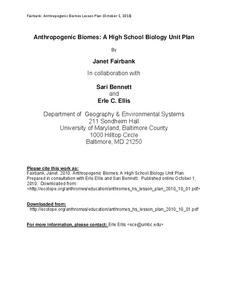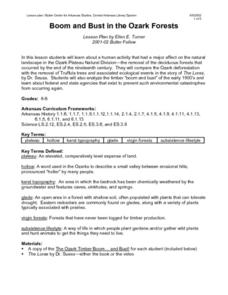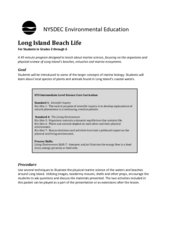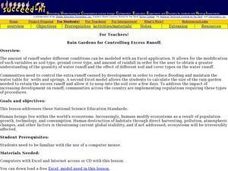Curated OER
Lizard Lab
In this detailed and comprehensive multi-day activity, budding evolutionary biologists use real data from lizard populations in the Canary Islands to examine evolution and natural selection.
Curated OER
Anthropogenic Biomes
If you teach a man to fish, he will never go hungry—or he will overfish and permanently damage the ecosystem? Address the traditional biomes as well as the human-included ecosystems and contrasts the biotic and abiotic factors in each....
Polar Trec
Bering Sea Fabulous Food Chain Game
In spring, the Bering Sea turns green due to phytoplankton, which live at the surface, experiencing a population explosion. Groups of scholars play a food chain game, writing down food chains as the game is played. After five to six...
WK Kellogg Biological Station
Sounds of Selection
Do you want a creative and fun way to teach about natural selection? Hop to it by turning your middle school princes and princesses into frogs trying to catch as many bugs as possible in a Hungry Hungry Hippos style game. For high...
Curated OER
Boom and Bust in the Ozark Forests
Here is a hard-hitting, cross-curricular lesson on the effects that the deforestation of the Ozark forests in the 19th century had on the people, animals, and ecosystems of the area. The Dr. Seuss book The Lorax is used as a way of...
Curated OER
Web of Life
Highlight the importance of each animal in an ecosystem by having scholars research different endangered species. Research is a lot more streamlined when learners are provided with a tool such as the graphic organizer attached here. How...
Curated OER
Long Island Beach Life
Have your class learn about marine life through this resource. This comprehensive lesson has learners discuss marine life, learn key vocabulary, discuss environmental concerns, and play games related to migration and predator/prey...
Teach Engineering
Bees: The Invaluable Master Pollinators
There is nothing in the world quite like a bee. Here is a video that explains the importance of bees to pollination. Scholars consider possible solutions to the declining population of bees in the ninth and final installment in the series.
Curated OER
Survival Of The Fittest
Seventh graders examine the concept of an ecosystem and how there is a variety of representations of life that exist there. They look at the equilibrium that is reached in stable communities and how the variable of change in...
Curated OER
Our World A Complex Eco-system
Sixth graders set up an ecosystem, investigate conservation techniques, develop an action plan for conservation, and various other activities to explore the ecosystem.
Curated OER
The Gulf of Maine
Learners examine their own environments and make connections to larger ecosystems. They watch a video about the gulf of Maine and record the changes that have occurred. They research the gulf and create a food web.
Curated OER
Survivor
Seventh graders investigate changes in the ecosystem within the school year. They see that ecosystems, communities, populations, and organisms are dynamic and change over time. They, in groups, collect data in quadrants in the fall,...
Curated OER
Discovering the Oasis
Students focus on the types of vegetation and animal life living around local water sources. This lesson can be adapted to any local water source, whether it be a lake, a river, stream or ocean. It has a particular focus on the bird...
Curated OER
Bat Habitat
Ninth graders engage in a lesson to find the role of bats in the complexity of certain ecosystems. They identify where bats live and the daily role played in the ecosystem. Students also construct a bat house to help control the...
Curated OER
Gwynns Falls
Students investigate the question: What is the impact of urban development and expansion on the health of a decidious forest ecosystem and humans? They examine the issue of land development by responding to a specific scenario and...
Curated OER
Rain Gardens for Controlling Excess Runoff
Students address the idea that human beings live within the world' ecosystems. They discuss how humans modify ecosystems as a result of population growth, technology, and consumption. Students discuss how the human destruction of...
Curated OER
National Parks in Atlantic Canada
Tenth graders research and discuss factors that have an effect on the sustainability of national park ecosystems in Canada. They examine changes in thinking that have led to new park management practices.
Curated OER
The Portable Niche
Third graders, in groups, research animals, plants, and conditions found in ecosystems.
Curated OER
Fisheries Research Methods
Students explore how scientists keep track of fish populations and why it is important to do so. They describe three methods currently used to sample fish populations. They participate in activities to simulate several of the sampling...
Curated OER
Daphnia and Algae: A Study of Pond Dynamics
Students observe interrelationships and interdependencies of organisms which may generate stable ecosystems. They also study that living organisms have the capacity to produce infinite sized populations, but environments and resources...
Curated OER
Introduction to Simulation Project
Students create a simulated self-sustaining ecosystem. For this biology lesson, students examine the different food chain and ecosystems in their model. They recommend some improvements and changes to an existing ecosystem.
Curated OER
Illinois' Habitats Happening
High schoolers use the scientific inquiry method to examine the ecosystems and biomes in Illinois. Using the characteristics of a local habitat, they identify the best conditions for an ecosystem to survive and how a slight change can...
Curated OER
Land Use
Young scholars examine ecosystems that covered Illinois 200 years ago, investigate some living and non-living components of ecosystems, identify components of prairie system, create food webs, and observe human effects on environment....
Curated OER
Food Webs in the Bay
Students get acquainted with a type of ecosystem and how different organisms of that ecosystem compete with one another for resources. They analyze the submerged aquatic vegetation of a bay ecosystem. Students study plants.

























